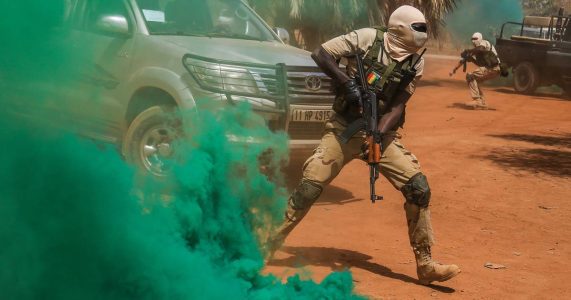
Extremist terror groups strike gold in Africa’s Sahel
For Islamic extremists, African gold mines are a treasure trove both of explosives and funds to recruit new members and buy arms.
Around Pama, a West African town on the edge of vast forested conservation areas, had long been forbidden by their government to dig for gold in the reserves, in order to protect antelope, buffalo, and elephants.
In mid-2018, men wearing turbans changed the rules. Riding in with assault rifles, on motorbikes and in 4×4 trucks, they sent government troops and rangers fleeing from the area in eastern Burkina Faso bordering the Sahel, a belt of scrubland south of the Sahara Desert.
The armed men said residents could mine in the protected areas, but there would be conditions. Sometimes they demanded a cut of the gold. At other times they bought and traded it.
The men “told us not to worry. They told us to pray,” said one man who gave his name as Trahore and said he had worked for several months at a mine called Kabonga, a short drive northwest of Pama.
Like other miners, he asked not to be identified for fear of retribution. It was not safe for reporters to visit the region, but five other miners who had been to Kabonga corroborated his account.
“We called them ‘our masters’,” said Trahore.
The pits around Pama are no isolated case. Groups linked to al Qaeda and Islamic State, having lost ground in the Middle East, are expanding in Africa and exploiting gold mines across the region, data on attacks, and interviews with two dozen miners and residents, and government and security officials, show. Besides attacking industrial operations, two of the world’s most feared extremist forces are tapping the €2 billion informal gold trade in Burkina Faso, Mali and Niger — a flow that is already largely out of state control.
Researchers and the United Nations have warned of the risks of armed extremists reaching the region’s gold mines; Reuters’ analysis of data from Burkina Faso, and testimony from people who have fled mining areas, show this is happening at scale.
For the Islamists, the mines are both a hideout and a treasure trove: Of funds with which to recruit new members and buy arms, and of explosives and detonators to stage the attacks that extend their power.
A poor country of mainly subsistence farmers, Burkina Faso has in recent years become the focus of a campaign by local insurgents and regional jihadi groups. The violence has killed hundreds of people, including at least 39 gold mine workers ambushed on a road earlier this month. Dozens of robberies and kidnappings have been reported that target mining.
The attacks extend towards hundreds of small-scale mines in Burkina Faso alone. Around 2,200 possible informal gold mines were identified in a government survey of satellite imagery in 2018. About half of them are within 25km of places where militants have carried out attacks, according to the analysis of incidents which were documented by Armed Conflict Location & Event Data Project (ACLED), a consultancy that tracks political violence.
The militants’ advance has traced a route from the north towards the south and the east of the country, according to the analysis, which mapped their movements and mining areas with help from the US-based Countering Wildlife Trafficking Institute, a consultancy with expertise in analysing geospatial data. The militants have carved a path through some of Burkina Faso’s richest gold fields, the analysis found.
It is hard to say how much gold the mines produce or exactly who controls them — many are in places where government forces are absent and bandits roam — but the sums involved are huge. In 2018, government officials visited just 24 sites near where attacks had taken place and estimated they produced a total of 727kg of gold per year, worth about €30m.
Oumarou Idani, Burkina Faso’s minister of mines, said in May that Islamists had taken control of some mines, especially in protected areas, where they encouraged camps of miners to dig in violation of government bans. “They fed the camp and bought and sold gold,” he said.
Incidents linked to Islamists dropped sharply that month, after military operations helped drive insurgents from mining areas. But by October, the total had almost returned to its peak from before the military actions, the ACLED data shows.
Most of Burkina Faso’s informally produced gold is smuggled to its neighbours, particularly Togo, to avoid export taxes, according to the government. It is then flown to refineries before it is exported to countries including Saudi Arabia, Turkey, Switzerland, and India. “Violent extremists have extended their areas of control and have enhanced their ability to generate income through gold, while state actors remain poorly positioned to do anything about it,” said William Linder, a former CIA officer, who served in West Africa and now runs a risk consultancy.
“Failure to fix this problem now will only deepen and help spread the Sahel crisis.”
Burkina Faso security minister Ousseni Compaore said the government was not failing: Governments in the region are aware of the risk and working together to tackle it, he said.
In Mali, the UN has reported that rebels tax the gold trade in the northern town of Kidal, and in Niger, government officials say Islamists are demanding a share of gold produced in the
Source: Irish Examiner





